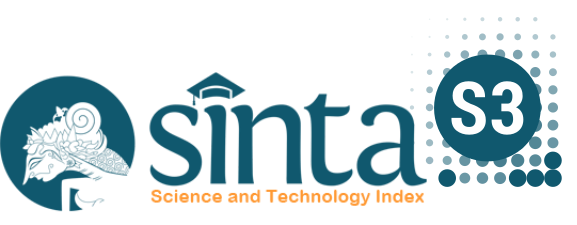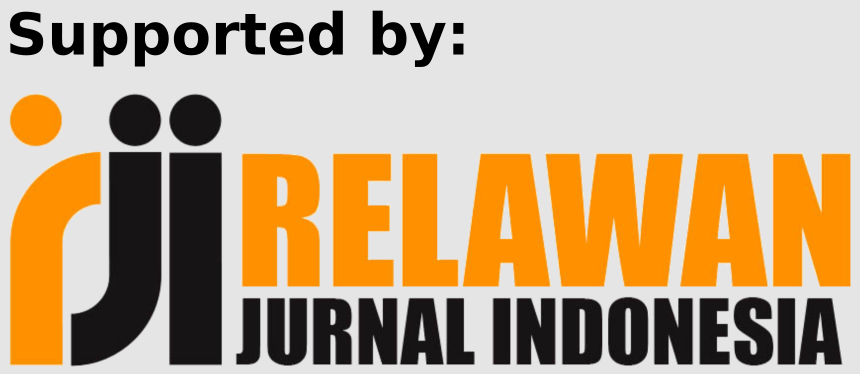Perinatal interventions to reduce the severity of postpartum depression: A narrative review
DOI:
https://doi.org/10.31101/jhtam.3057Kata Kunci:
Postpartum, Depression, Intervention, Narrative ReviewAbstrak
Postpartum depression (PPD) is a mental disorder that can affect mothers and their families, with symptoms of fatigue, mood swings, frequent anger for no reason, and excessive worry for the baby. Several studies regarding interventions that can be given to postpartum women with PPD have been carried out. The purpose of this review is to assess evidence on the effectiveness of a broad range of perinatal interventions to reduce the severity of PPD. The review of the literature has been done through PubMed, for papers with Randomized Control Trial (RCT) design published in 2012-2021. The approach was to explore quantitative parameters which is the EPDS score. More than 300 papers were identified, but only 6 studies met the inclusion criteria. A narrative review was conducted due to the studies' significant heterogeneity. Six studies reported a decrease in EPDS score. Six interventions have been identified to reduce the severity of PPD, they are exercise, psychological intervention, telephone-based Cognitive Behavioral Therapy (CBT), iBA (internet Behavioral Activation), application-based Cognitive Behavioral Therapy (CBT) and psychoeducation. This review suggests that multiple intervention program may lead to better outcomes in terms of client’s satisfaction. There is also some indication that psychoeducation support Maternal Parental Self-efficacy (MPSE) and social support besides EPDS.Referensi
Ayaz, R., Hocaoǧlu, M., Günay, T., Yardlmcl, O. D., Turgut, A., & Karateke, A. (2020). Anxiety and depression symptoms in the same pregnant women before and during the COVID-19 pandemic. Journal of Perinatal Medicine, 48(9), 965–970. https://doi.org/10.1515/jpm-2020-0380
Bauer, A., Knapp, M., & Parsonage, M. (2016). Lifetime costs of perinatal anxiety and depression. Journal of Affective Disorders, 192, 83–90. https://doi.org/10.1016/j.jad.2015.12.005
Bohari, N. H., As’ad, S., Khuzaimah, A., Miskad, U. A., Ahmad, M., & Bahar, B. (2020). The effect of acupressure therapy on mothers with postpartum blues. Enfermeria Clinica, 30, 612–614. https://doi.org/10.1016/j.enfcli.2019.07.173
Elden, H., Gutke, A., Kjellby-Wendt, G., Fagevik-Olsen, M., & Ostgaard, H. C. (2016). Predictors and consequences of long-term pregnancy-related pelvic girdle pain: A longitudinal follow-up study. BMC Musculoskeletal Disorders, 17(1), 1–13. https://doi.org/10.1186/s12891-016-1154-0
Fanti, Serrati, & D’Agostino. (2022). Sleep and Perinatal Depression. In Sleep and Neuropsychiatric Disorders. Springer Singapore. https://doi.org/10.1007/978-981-16-0123-1_18
Field, T., Diego, M., Delgado, J., & Medina, L. (2013). Yoga and social support reduce prenatal depression, anxiety and cortisol. Journal of Bodywork and Movement Therapies, 17(4), 397–403. https://doi.org/10.1016/j.jbmt.2013.03.010
Forder, Rich, Harris, Chojenta, Reilly, Austin, & Loxton. (2020). Honesty and comfort levels in mothers when screened for perinatal depression and anxiety. Women and Birth, 33(2), 142–150. https://doi.org/10.1016/j.wombi.2019.04.001
Goodman, J. H., Guarino, A., Chenausky, K., Klein, L., Prager, J., Petersen, R., Forget, A., & Freeman, M. (2014). CALM Pregnancy: results of a pilot study of mindfulness-based cognitive therapy for perinatal anxiety. Archives of Women’s Mental Health, 17(5), 373–387. https://doi.org/10.1007/s00737-013-0402-7
Hamazaki, Takamori, Tsuchida, Kigawa, Tanaka, Ito, & Katoh. (2018a). Dietary intake of fish and n-3 polyunsaturated fatty acids and risks of perinatal depression: The Japan Environment and Children’s Study (JECS). Journal of Psychiatric Research, 98(1), 9–16. https://doi.org/10.1016/j.jpsychires.2017.11.013
Hamazaki, Takamori, Tsuchida, Kigawa, Tanaka, Ito, & Katoh. (2018b). Dietary intake of fish and n-3 polyunsaturated fatty acids and risks of perinatal depression: The Japan Environment and Children’s Study (JECS). Journal of Psychiatric Research, 98(1), 9–16. https://doi.org/10.1016/j.jpsychires.2017.11.013
Jannati, Mazhari, Ahmadian, & Mirzaee. (2020a). Effectiveness of an app-based cognitive behavioral therapy program for postpartum depression in primary care: A randomized controlled trial. International Journal of Medical Informatics, 141(9), 104–145. https://doi.org/10.1016/j.ijmedinf.2020.104145
Jannati, N., Mazhari, S., Ahmadian, L., & Mirzaee, M. (2020b). Effectiveness of an app-based cognitive behavioral therapy program for postpartum depression in primary care: A randomized controlled trial. International Journal of Medical Informatics, 141(September 2019), 104145. https://doi.org/10.1016/j.ijmedinf.2020.104145
Jiang, L., Wang, Z. Z., Qiu, L. R., Wan, G. Bin, Lin, Y., & Wei, Z. (2014). Psychological intervention for postpartum depression. Journal of Huazhong University of Science and Technology - Medical Science, 34(3), 437–442. https://doi.org/10.1007/s11596-014-1297-x
López-Morales, H., del Valle, M. V., Canet-Juric, L., Andrés, M. L., Galli, J. I., Poó, F., & Urquijo, S. (2020). Mental health of pregnant women during the COVID-19 pandemic: A longitudinal study. Psychiatry Research. https://doi.org/10.1016/j.psychres.2020.113567
Marsay, C., Manderson, L., & Subramaney, U. (2017). Validation of the Whooley Questions for antenatal depression and anxiety among low-income women in urban South Africa. South African Journal of Psychiatry, 23(1). https://doi.org/10.4102/sajpsychiatry.v23i0.1013
Milgrom, Gemmill, Ericksen, Burrows, Buist, & Reece. (2015). Treatment of postnatal depression with cognitive behavioural therapy , sertraline and combination therapy: A randomised controlled trial. https://doi.org/10.1177/0004867414565474
Moraes, G. P. de A., Lorenzo, L., Pontes, G. A. R., Montenegro, M. C., & Cantilino, A. (2017a). Triagem e diagnóstico de depressão pós-parto: Quando e como? Trends in Psychiatry and Psychotherapy, 39(1), 54–61. https://doi.org/10.1590/2237-6089-2016-0034
Moraes, Lorenzo, Pontes, Montenegro, & Cantilino. (2017b). Triagem e diagnóstico de depressão pós-parto: Quando e como? Trends in Psychiatry and Psychotherapy, 39(1), 54–61.
Ngai, F. W., Wong, P. W. C., Leung, K. Y., Chau, P. H., & Chung, K. F. (2015a). The Effect of Telephone-Based Cognitive-Behavioral Therapy on Postnatal Depression: A Randomized Controlled Trial. Psychotherapy and Psychosomatics, 84(5), 294–303. https://doi.org/10.1159/000430449
Ngai, Wong, Leung, Chau, & Chung. (2015b). The Effect of Telephone-Based Cognitive-Behavioral Therapy on Postnatal Depression: A Randomized Controlled Trial. Psychotherapy and Psychosomatics., 84(5), 294–303. https://doi.org/10.1159/000430449
O’Hara, & Mc Cabe. (2013). Postpartum depression: Current status and future directions. Annual Review of Clinical Psychology., 9(1), 379–407. https://doi.org/10.1146/annurev-clinpsy-050212-185612
O’Mahen, Woodford, McGinley, Warren, Richards, Lynch, & Taylor. (2013). Internet-based behavioral activation-Treatment for postnatal depression (Netmums): A randomized controlled trial. Journal of Affective Disorders, 150(3), 814–822.
Özkan, Kücükkelepce, Korkmaz, Yılmaz, & Bozkurt. (2020). The effectiveness of an exercise intervention in reducing the severity of postpartum depression: A randomized controlled trial. Perspectives in Psychiatric Care., 56(4), 844–850. https://doi.org/10.1111/ppc.12500
Shorey, Chan, Chi, Chong, & He. (2015). Perceptions of primiparas on a postnatal psychoeducation programme: The process evaluation. Midwifery., 31(1), 155–163. https://doi.org/10.1016/j.midw.2014.08.001
Shorey, Chan, Chong, & He. (2015). A randomized controlled trial of the effectiveness of a postnatal psychoeducation programme on self-efficacy, social support and postnatal depression among primiparas. Journal of Advanced Nursing., 71(6), 1260–1273.
Shorey, S., Chee, C. Y. I., Ng, E. D., Chan, Y. H., Tam, W. W. S., & Chong, Y. S. (2018). Prevalence and incidence of postpartum depression among healthy mothers: A systematic review and meta-analysis. Journal of Psychiatric Research, 104, 235–248. https://doi.org/10.1016/j.jpsychires.2018.08.001
Stewart, D. E., & Vigod, S. N. (2019). Postpartum depression: Pathophysiology, treatment, and emerging therapeutics. Annual Review of Medicine, 70, 183–196. https://doi.org/10.1146/annurev-med-041217-011106
Wilkinson, Anderson, & Wheeler. (2016). Screening for and Treating Postpartum Depression and Psychosis: A Cost-Efectiveness Analysis. Maternal and Child Health Journal, 1(1), 15. https://doi.org/10.1007/s10995-016-2192-9
Wu, Y., Zhang, C., Liu, H., Duan, C., Li, C., Fan, J., Li, H., Chen, L., Xu, H., Li, X., Guo, Y., Wang, Y., Li, X., Li, J., Zhang, T., You, Y., Li, H., Yang, S., Tao, X., … Huang, H. feng. (2020). Perinatal depressive and anxiety symptoms of pregnant women during the coronavirus disease 2019 outbreak in China. American Journal of Obstetrics and Gynecology, 223(2), 240.e1-240.e9. https://doi.org/10.1016/j.ajog.2020.05.009
Unduhan
Diterbitkan
Cara Mengutip
Terbitan
Bagian
Lisensi
Hak Cipta (c) 2023 Hanifatur Rosyidah

Artikel ini berlisensiCreative Commons Attribution-ShareAlike 4.0 International License.
Authors who publish with Journal of Health Technology Assessment in Midwifery agree to the following terms:
- Authors retain copyright and grant the journal right of first publication with the work simultaneously licensed under a Creative Commons Attribution License (CC BY-SA 4.0) that allows others to share the work with an acknowledgment of the work's authorship and initial publication in this journal.
- Authors are able to enter into separate, additional contractual arrangements for the non-exclusive distribution of the journal's published version of the work (e.g., post it to an institutional repository or publish it in a book), with an acknowledgment of its initial publication in this journal.
- Authors are permitted and encouraged to post their work online (e.g., in institutional repositories or on their website) prior to and during the submission process, as it can lead to productive exchanges, as well as earlier and greater citation of published work.

Journal of Health Technology Assessment in Midwifery is licensed under a Creative Commons Attribution-ShareAlike 4.0 International License..















